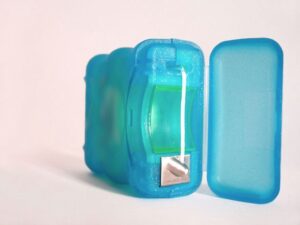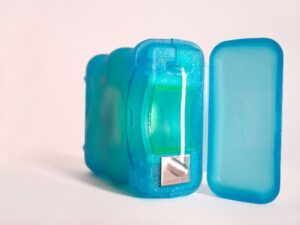
Loose teeth, bad breath, and painful, bloody gums – these are among the signs and symptoms of periodontal, or gum, disease. Unfortunately, periodontal disease can also begin without any obvious symptoms. If left undiagnosed or untreated, you could be at risk for irreparable damage to your teeth and gums. The good news is that periodontal disease is preventable. In fact, one of the most effective tools for preventing the disease only takes a minute of your time each day.
Floss to the Rescue
Dental floss is an effective and easy to use tool that can be among your best defenses for preventing periodontal disease. Periodontal disease is caused by a buildup of plaque and bacteria. Even if your daily oral hygiene routine already includes a thorough brushing that lasts for two minutes, at least twice each day, you should be flossing daily as well. Dental floss is highly effective at cleaning areas where your toothbrush cannot reach. Small gaps and tight spaces between teeth catch food debris and sugars and acids from drinks all day long. Flossing helps to clean out these tough to reach spaces.
Facts Behind Flossing
According to a survey referenced by the American Dental Association, only 40% of Americans floss each day. The same study showed a clear link between regular intra-oral care and better oral health. Unfortunately, many people also lie about how frequently they clean between their teeth. A study from the American Academy of Periodontology found that 27% of adults lie to their dentist about their flossing habits.
Tips for Flossing Correctly
It can be confusing to figure out the best way to use dental floss. Try cutting off about 18 inches of floss and wrapping most of it carefully around your middle finger. Use roughly one inch to clean between each pair of teeth. Using your thumb and index finger, carefully slide the floss between your teeth. Floss to your gumline, but be gentle. Avoid cutting your gums. Work your way through your 18 inches of floss by using a new, clean section between each pair of adjacent teeth.
It only takes about a minute to floss your teeth each day, but these minutes contribute to a lifetime of optimal oral health. Floss is among the most effective tools at your disposal to keep your gums clean and healthy. Get into the habit of flossing your teeth regularly – your gums will thank you.
For more information about gum health, or to schedule a visit to our office, please contact our dental team.
Chicago Dental Implants, Oral & Facial Surgery
Phone: (708) 301-5000
Url: https://chicagodentalimplants.com/
10713 W 159th Street
Orland Park, IL 60467









 Your smile is the first thing someone notices about your face. Cosmetic imperfections can influence the way you view yourself, impacting your level of self-confidence. Oral and facial surgery is dedicated to helping you live a healthy, confident life. Oral and facial surgery can improve your appearance and your health.
Your smile is the first thing someone notices about your face. Cosmetic imperfections can influence the way you view yourself, impacting your level of self-confidence. Oral and facial surgery is dedicated to helping you live a healthy, confident life. Oral and facial surgery can improve your appearance and your health.




